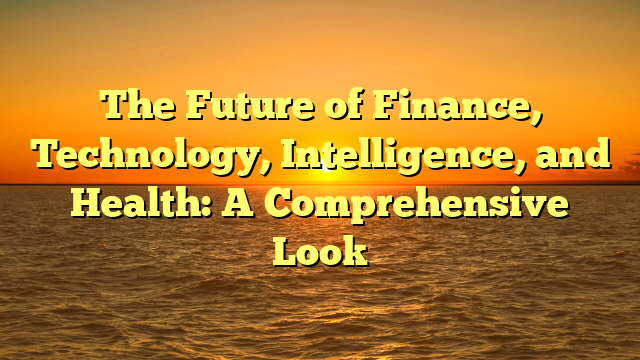Introduction: In today’s rapidly evolving world, the convergence of finance, intelligence, innovation, and health is revolutionizing industries and daily life. As these fields grow increasingly interconnected, they are creating opportunities and challenges that will shape the future. This article explores the interrelationship between these sectors and how their integration is redefining the way we approach personal well-being, economic stability, and technological progress.
Finance and Technology: Advancements in technology have significantly impacted the financial industry. The rise of financial technology, blockchain, and artificial intelligence has led to the creation of more efficient, secure, and innovative financial systems. This has revolutionized everything from everyday banking to investment strategies, allowing individuals and businesses to access financial services with greater ease and speed.
The integration of AI in finance also presents new possibilities for predictive analytics, risk management, and fraud prevention. By processing vast amounts of data in real-time, AI can identify patterns and anomalies that humans might miss, enabling more informed decision-making. In addition, blockchain is disrupting traditional financial institutions by offering decentralized alternatives that remove the need for intermediaries, reduce costs, and increase transparency.
Intelligence and Technology: Artificial intelligence and machine learning are increasingly becoming vital components of various industries, especially in healthcare. AI is revolutionizing medical practices by providing doctors with powerful tools to enhance diagnosis, predict patient outcomes, and offer personalized treatment strategies based on data-driven insights. These innovations are enhancing healthcare delivery and transforming the patient experience.
In finance, AI is being used for algorithmic trading, asset management, and fraud detection. By utilizing vast datasets, AI algorithms can optimize financial strategies and minimize human error, while also identifying patterns and trends that would be difficult for traditional systems to uncover.
Health and Technology: Technology is revolutionizing the healthcare sector by providing innovative tools for monitoring and managing health. Devices such as wearables and health tracking apps allow individuals to collect real-time data about their physical condition, empowering them to make healthier decisions and seek timely medical attention when needed. Furthermore, telemedicine platforms are offering greater access to healthcare services, especially in remote or underserved areas.
Artificial intelligence is making significant strides in the healthcare industry, particularly in drug development and personalized treatment plans. By analyzing patient data, AI systems can predict treatment effectiveness and recommend tailored therapies. jakartaslot is leading to faster drug discovery and more precise treatments, which can ultimately improve patient outcomes while reducing healthcare costs.
Conclusion: As we look toward the future, the integration of financial technology, artificial intelligence, digital health, and medicine will continue to create new opportunities for innovation and improvement. While challenges remain, particularly around data security, ethical considerations, and regulatory frameworks, the potential for these fields to work together to enhance our quality of life is immense. By embracing these advancements, we can create a more connected, efficient, and healthier world.
